Meet Scalia Law Students Who Exemplify Our Motto: Learn. Challenge. Lead.
Cody Ray Milner, Class of 2021
U.S. Court, Western District of Oklahoma
Judicial Intern
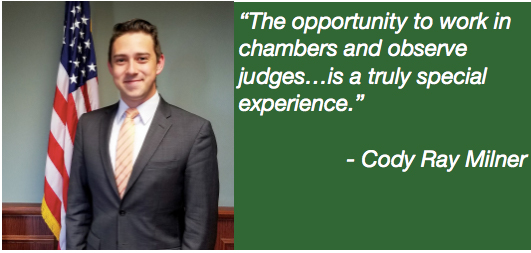
Cody Ray Milner jumped at the chance to work as a judicial intern for Judge Patrick R. Wyrick in the U.S. Court, Western District of Oklahoma, this summer.
What do you like best about this job?
The interaction with the Judge and the chamber clerks, and the ability to learn practical knowledge about practicing in a courtroom.
How has Scalia Law School prepared you for this work?
The writing program at Scalia Law is second to none, and the extra practice honing our legal research, drafting, and polished syntax comes in handy in all legal work.
What would you tell other law students considering this area of law?
The opportunity to work in chambers and observe judges considering legal questions, observe what works and what doesn’t work in the practice of law, is truly a special experience.
Elizabeth Velander, Class of 2020
Sony Music Entertainment, New York
Legal Intern
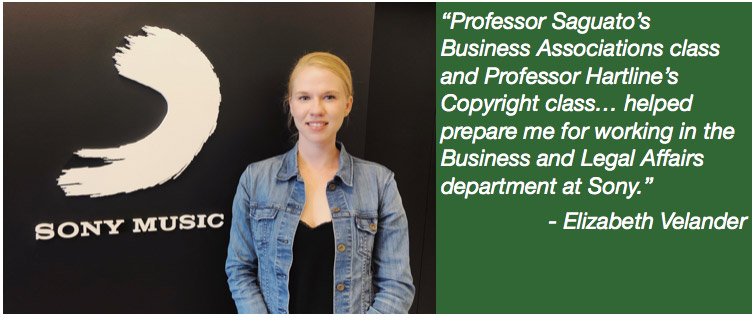
Elizabeth Velander snagged a legal internship in the Business and Legal Affairs Department at Sony Music Entertainment.
What do you like best about your work?
What I like best about working for Sony Music Entertainment is the people I work with. The attorneys here have a wealth of knowledge about the music industry that they share with me every day by giving me substantive projects and thoughtful feedback.
How did Scalia Law prepare you for this job?
Professor Saguato’s Business Associations class, Professor Hartline’s Copyright class and Transactional Drafting helped prepare me for working in the Business and Legal Affairs department at Sony.
What would you tell other law students interested in this field of law?
Read everything you can about the industry and network.
Diana Thomson, Class of 2020
American Bar Association's Rule of Law Initiative
Intern
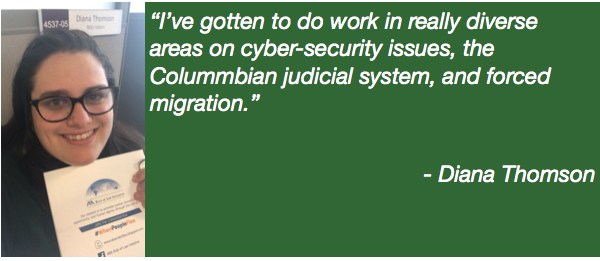
Diana Thomson landed at the ABA’s Rule of Law Initiative, an international development program that promotes the rule of law by working with in-country partners to build sustainable institutions and societies that deliver justice.
What do you like best about this job?
I've gotten to do work in really diverse areas on cyber-security issues, the Colombian judicial system, and forced migration. I've also gotten to attend really interesting panels on cyber-security, European competition law, and the Stonewall riots.
How has Scalia Law School prepared you for this work?
Scalia Law has given me a great background in research and in legal frameworks and the inner-workings of government agencies. It also supported me when I took international law classes and interned in Europe last summer, which helped lead to this internship.
What would you tell other law students considering this area of law?
For other students who are considering working in international law and international development, speaking another language-especially Spanish or French-is really helpful. It definitely helps distinguish me and gives me more opportunities at work.
Connor Glisson, Class of 2020
National Telecommunications and Information Administration
Legal Intern
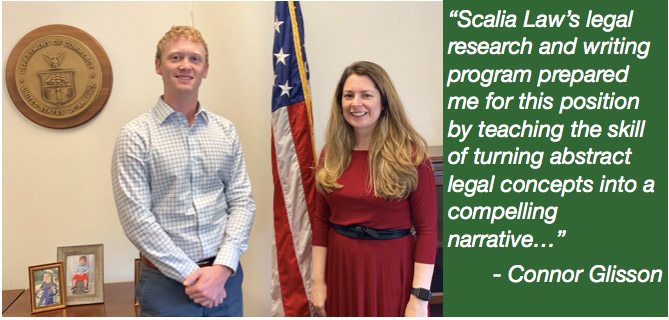
Connor Glisson secured a position as a legal intern at the Department of Commerce in the Office of Acting Assistant Secretary Diane Rinaldo at the National Telecommunications and Information Administration (NTIA).
What do you like best about this job?
This position has given me the opportunity to work on telecommunications issues from a different perspective than I have in the past. I enjoy the range of groups NTIA interacts with on a daily basis and the balance NTIA must strike between expanding broadband Internet access, while at the same time protecting federally-owned spectrum.
How has Scalia Law School prepared you for this work?
Scalia Law’s legal research and writing program prepared me for this position by teaching the skill of turning abstract legal concepts into a compelling narrative that a judge can quickly grasp and apply. When working with policymakers, who often know little about the technology they are tasked with regulating, it's critical to find ways to make complicated ideas easy to understand.
What would you tell other law students considering this area of law?
Communications and technology is one of the fastest growing areas of the law right now. I encourage any fellow law students considering this career path to pursue it further. Take Scalia Law’s Communications Law class; intern at one of the many telecommunications organizations in the area; or join us for a Communications and Technology Law Association meeting this fall.
Miranda Isaacs, Class of 2021
Office of the Attorney General, Nashville, Tennessee
Law Clerk
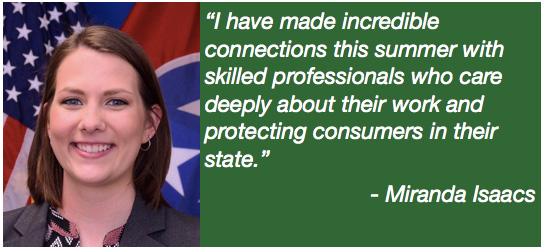
Miranda Isaacs accepted a summer position with the Janet D. Steiger Fellowship program through the ABA’s Section of Antitrust. The fellowship placed her in the Consumer Protection Division of the Office of the Attorney General in Nashville, Tennessee.
What do you like best about this job?
This job has provided exposure to enforcement of both state and federal consumer protection and antitrust laws. I’ve had the opportunity to work on multi-state investigations into national companies, comments to federal regulatory agencies, merger reviews, data breach investigations, and many other interesting topics, while also gaining meaningful experience in public service.
How has Scalia Law prepared you for this work?
The writing program at Scalia Law set me up to be successful in this position. I felt prepared to begin working on writing assignments upon arriving at the office.
What would you tell other law students considering this area of law?
Both consumer protection and antitrust present great opportunities in the public sector. Consider working in the office of a state Attorney General! I have made incredible connections this summer with skilled professionals who care deeply about their work and protecting consumers in their state.
Joshua McKenney, Class of 2020
Office of the Staff Judge Advocate for the 21st Theater Sustainment Command
Kaiserslautern, Germany
Intern
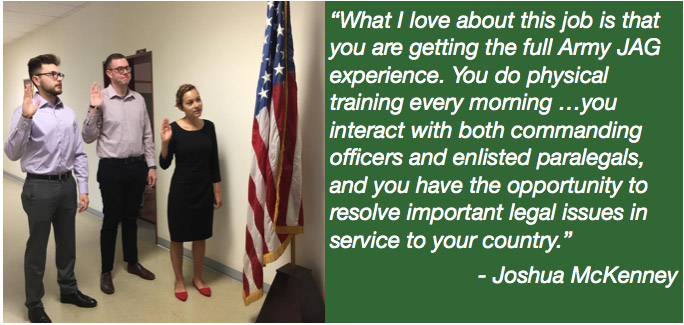
Joshua McKenney works in the Office of the State Judge Advocate for the 21st Theater Sustainment Command in Europe which oversees the resolution of legal issues for the U.S. Army in Europe. He engages with military justice; legal assistance for service members, retired service members, and civilian contractors; and administrative/operational law.
What do you like best about this job?
What I love about this job is that you are getting the full Army JAG experience. You do physical training every morning with your unit before work, you interact with both commanding officers and enlisted paralegals, and you have the opportunity to resolve important legal issues in service to your country. In addition, you are able to experience what it is like to deploy to a foreign country.
How has Scalia Law School prepared you for this work?
The work I do here is unique and JAG officers are generalists; they are expected to do a little bit of everything. The writing courses at Scalia Law have helped me to improve my research and drafting skills, the level of professionalism in my writing and communication, as well as my time management. Additionally, the techniques I was taught in the Trial Advocacy class, taught by Judge Alston and Judge Jarvis, have helped in assisting Military Justice with courts martial. Being able to read panel expressions during voir dire and draft direct/cross examination questions has been invaluable.
What would you tell other law students considering this area of law?
A career in the JAG services is not like many other public interest jobs. You are a soldier first and an attorney second. A commitment to service and a desire to lead are a must if you are applying to this position. However, it is an incredible experience and you will get to work with great people doing important work for your country, living in locations you may otherwise never see.
Rita Regelbrugge, Class of 2021
Wiley Rein LLP
Summer Law Clerk
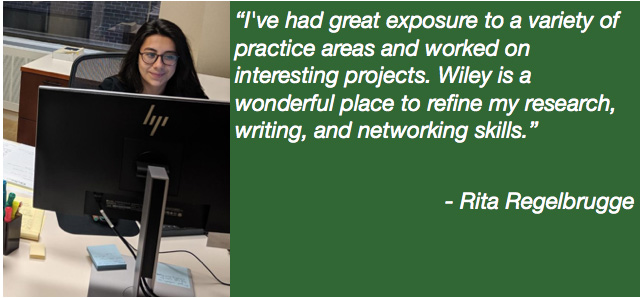
Rita Regelbrugge obtained a summer clerkship at Wiley Rein LLP, where she is working on projects in Litigation, White Collar Defense, Government Contracts, Telecom Media & Technology, and Corporate groups.
What do you like best about this job?
I enjoy working in a dynamic environment. Summering with Wiley allows me to work with outstanding attorneys and to dabble in a variety of practice areas.
How has Scalia Law School prepared you for this work?
My core classes at GMU law required me to think analytically and to examine legal reasoning patterns. Strong legal reasoning skills are paramount to the work I’ve been doing this summer, especially legal research projects.
Would you recommend Big law to other students?
I would encourage students to consider Big Law, especially for a summer position. This summer, I’ve had great exposure to a variety of practice areas and worked on interesting projects. Wiley is a wonderful place to refine my research, writing, and networking skills. I suggest that interested students reach out to alumni to learn about experience first-hand.
Chad Crowell, Class of 2020
The US Court of International Trade
Judicial Intern
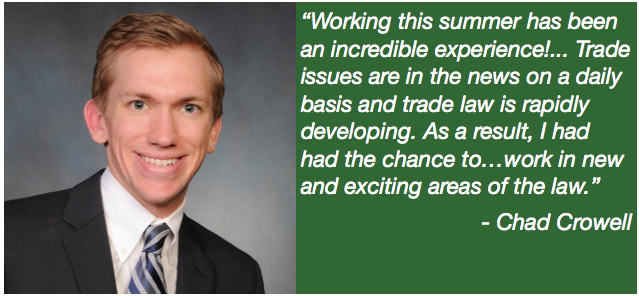
Chad Crowell has taken advantage of multiple clerkships and internships during his time at Scalia Law. This summer, he is working as a judicial intern at the U.S. Court of International Trade (USCIT).
What do you like best about this job?
Working this summer has been an incredible experience. The opportunity to work closely with the Judge and the clerks, attend oral arguments, and see how opinions are formulated has been both informative and exciting. Trade issues are in the news on a daily basis and trade law is rapidly developing. As a result, I have had the chance to see cases of first impression and work in new and exciting areas of the law, and I am encouraged to provide input and formulate my own opinions on cases.
How did Scalia Law prepare you for this job?
The extensive legal writing experience I received and the International Trade course I took during my time at Scalia Law have helped me be an active, productive participant in conversations about cases and when preparing bench memos.
What would you tell other law students interested in this area of law?
I highly recommend a judicial internship to anyone interested in a particular field of law or in clerking. I have greatly enjoyed my time with the USCIT and can't wait for what is to come over the rest of the summer!